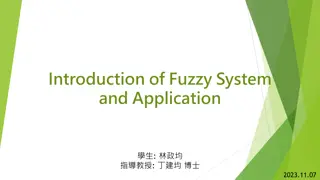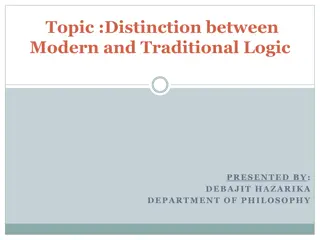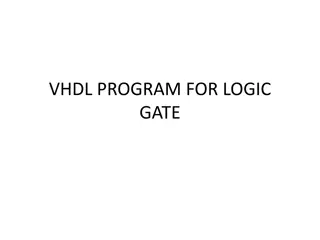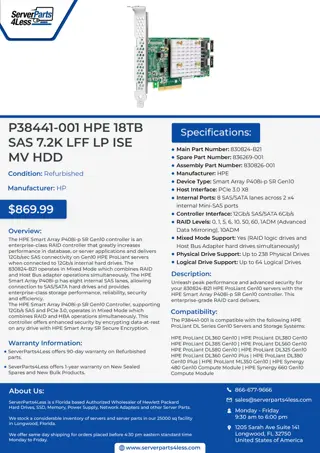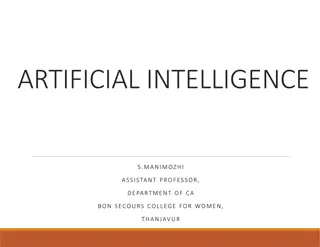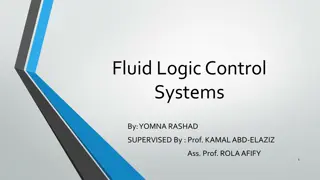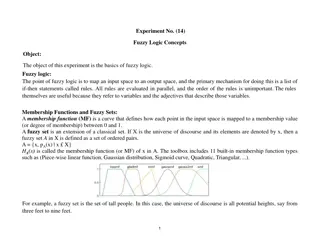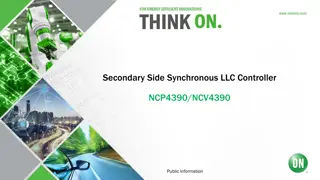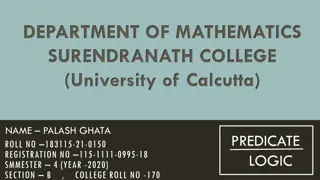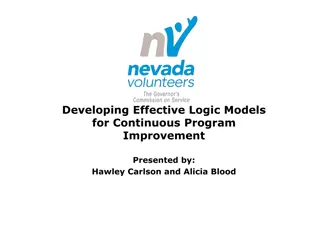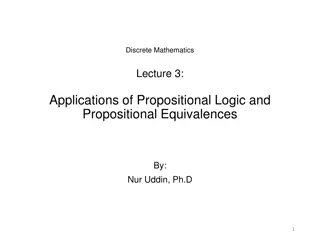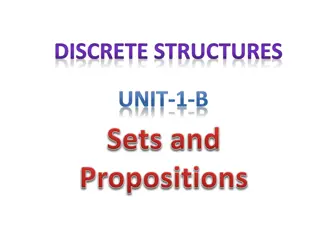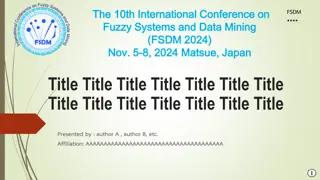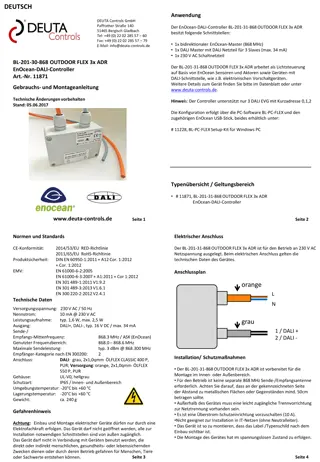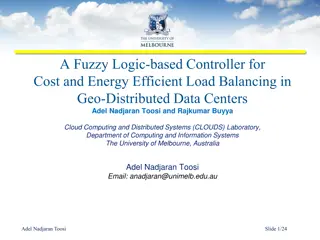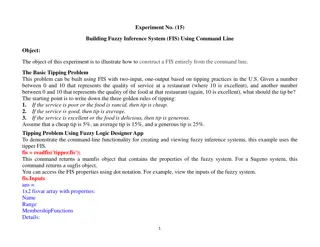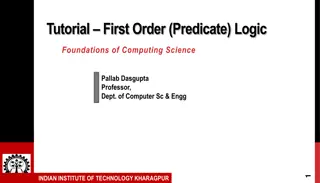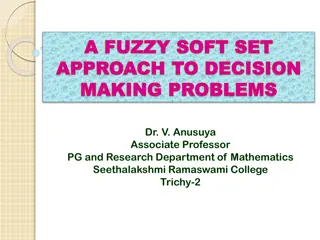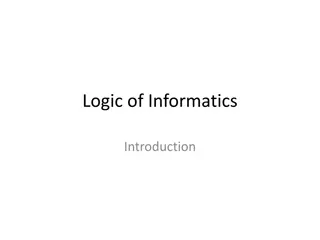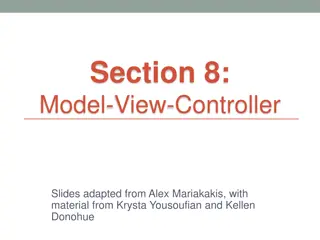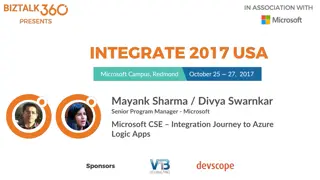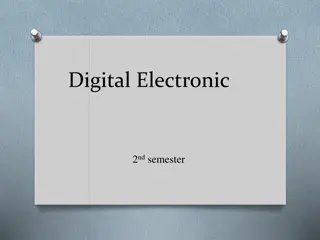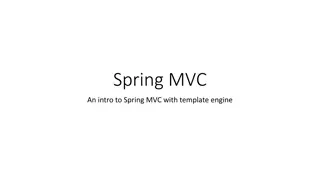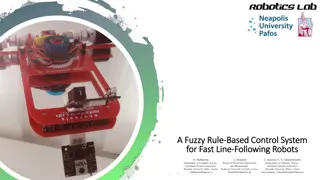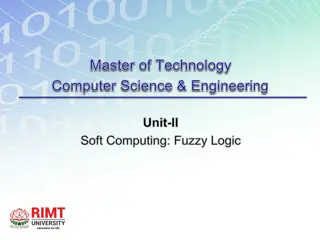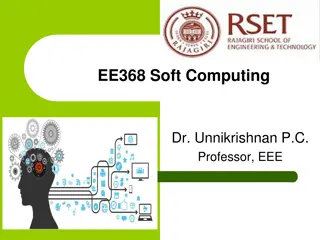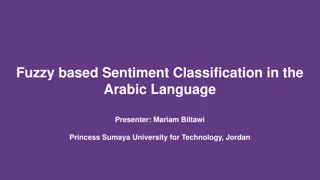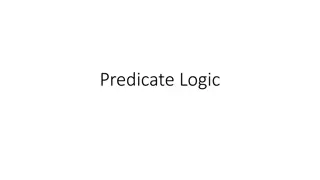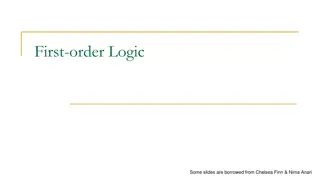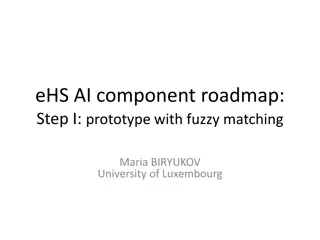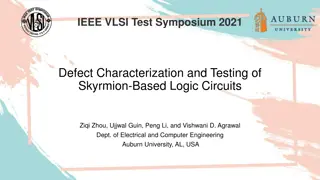Introduction of Fuzzy System and Application
Fuzzy logic, introduced by Professor Zadeh in 1965, offers a way to model linguistic fuzzy information, providing better generalization and error tolerance for nonlinear systems. Fuzzy sets remove sharp boundaries in classical sets, allowing for gradual transitions between membership and non-members
7 views • 23 slides
Topic : Distinction between Modern and Traditional Logic.
Logic, as a normative study, focuses on distinguishing correct reasoning from incorrect. Traditional logic, based on Aristotle's work, emphasized syllogistic reasoning, while modern logic, pioneered by figures like Leibnitz and Russell, employs mathematical methods and symbolic logic for a more adva
3 views • 10 slides
Logic Families
Logic families such as Diode Logic (DL), Resistor-Transistor Logic (RTL), and Diode-Transistor Logic (DTL) each have distinct capabilities and limitations when it comes to performing logic functions. While DL gates are simple and inexpensive but limited in functionality, RTL gates offer both normal
1 views • 22 slides
VHDL Logic Gate Programming Examples
This content provides VHDL code examples for various logic gates including AND, OR, NOT, XOR, and X-NOR gates along with their corresponding circuit diagrams. Each code snippet is accompanied by a brief explanation and a visual representation of the logic operation. The provided VHDL code can be uti
1 views • 7 slides
830824-B21 HPE P408I-P SR SAS-12G PCIE CONTROLLER GEN10
Refurbished | HPE 830824-B211 | P408I-P SR SAS-12G PCIE CONTROLLER GEN10 | \u2713 FREE and FAST Ground Shipping across the U.S. | Best Price Guaranteed\n\n\/\/ \/830824-b21-hpe-p408i-p-sr-sas-12g-pcie-controller-gen10\/
0 views • 1 slides
Predicate Logic in Artificial Intelligence
In the world of artificial intelligence, predicate logic plays a crucial role in representing simple facts. It involves syntax, semantics, and inference procedures to determine the truth value of statements. Real-world facts are represented using propositions in logic, allowing for structured knowle
1 views • 19 slides
Introduction to Fluid Logic Control Systems
Fluid logic control systems utilize devices that switch fluid, like air, between outlets, providing ON/OFF outputs swiftly based on control signals. This article explores moving-part logic devices, control functions, Boolean algebra applications in control technology, and advantages of fluid logic s
1 views • 22 slides
Fuzzy Logic Basics
Fuzzy logic is a powerful concept that involves mapping inputs to outputs using rules, membership functions, and fuzzy sets. Logical operations like AND, OR, and NOT play a key role, along with if-then rules in formulating conditional statements. The fuzzy inference process includes fuzzification, a
1 views • 9 slides
Logic Circuits in Aircraft Systems
Aircraft logic systems follow MIL/ANSI standard logic symbols and conventions used in electronic applications. Inverters, buffers, AND gates, OR gates, NAND gates, NOR gates, Exclusive-OR gates, and Exclusive-NOR gates are commonly used in aircraft logic circuits. These gates have specific behaviors
0 views • 52 slides
NCP4390/NCV4390 Secondary Side Synchronous LLC Controller
The NCP4390/NCV4390 is an advanced secondary side controller for LLC resonant converters with Synchronous Rectification (SR). It features current mode control based on charge control, dual-edge adaptive dead time control, and is an upgrade of FAN7688. The controller offers benefits like excellent tr
1 views • 6 slides
Introduction to Predicate Logic in Mathematics
Predicate logic is a powerful tool used in mathematics to express complex relationships and assertions that cannot be adequately represented by propositional logic. It allows for the quantification of statements over a range of elements using predicates and quantifiers like universal and existential
2 views • 13 slides
Developing Effective Logic Models for Continuous Program Improvement
Explore the essentials of logic models and their significance in evaluating programs for continuous improvement, presented by Hawley Carlson and Alicia Blood. Learn about theory of change, logic model components, and using logic models for evaluation planning.
6 views • 12 slides
Applications and Equivalences in Propositional Logic
This lecture explores applications of propositional logic, including translating sentences, system specifications, logic puzzles, and logic circuits. It also defines tautology, contradiction, and contingency as types of compound propositions, along with logical equivalences. Examples and illustratio
0 views • 16 slides
Optimizing Incremental Processing in OVN-Controller for Enhanced Efficiency
Explore the challenges faced in scaling OVN-Controller, the benefits and issues of recomputing OVS flows, and the implementation of an Incremental Processing Engine to efficiently handle dependencies. Dive into the Dependency Graph of OVN-Controller to understand the various components involved in t
1 views • 16 slides
Propositional Logic and Mathematical Logic in Computer Science
Study the development of formal logic in computer science, focusing on propositional logic and mathematical logic. Learn about propositions, logical operators, and ways of combining statements to derive conclusions. Explore examples and understand how to determine the validity of arguments using log
0 views • 38 slides
Satisfiability Modulo Abstraction for Separation Logic with Linked Lists
This study explores the application of satisfiability modulo abstraction in separation logic with linked lists. It presents a technique using abstract interpretation concepts to handle separation logic formulas beyond previous methods, specifically focusing on over-approximating heaps that satisfy t
0 views • 41 slides
Binary Logic Systems in Documentation
Binary logic systems play a crucial role in documentation for individuals with diverse backgrounds such as management, process designers, operations staff, maintenance technicians, and more. These systems, depicted in binary logic diagrams, provide a clear and concise representation for various prof
6 views • 16 slides
Introduction to Symbolic Logic: Understanding Logical Inferences
Logic is the study of reasoning methods to distinguish between correct and incorrect arguments. Symbolic Logic involves representing logic symbolically for easier understanding and manipulation. Logical inferences help in making decisions based on reasoning chains. The content discusses the use of l
1 views • 28 slides
UBU Performance Oversight Engagement Framework Overview
Providing an overview of the UBU Logic Model within the UBU Performance Oversight Engagement Framework, this session covers topics such as what a logic model is, best practice principles, getting started, components of the logic model, evidence & monitoring components, and next steps. The framework
1 views • 33 slides
International Conference on Fuzzy Systems and Data Mining 2024
The 10th International Conference on Fuzzy Systems and Data Mining (FSDM 2024) will be held in Matsue, Japan from Nov 5-8, 2024. The conference will feature presentations on various topics related to fuzzy systems, data mining, methodologies, results, and discussions. Participants will have the oppo
0 views • 8 slides
Outdoor Flex EnOcean-DALI Controller BL-201-31-868
The BL-201-31-868 OUTDOOR FLEX 3x ADR EnOcean-DALI Controller from DEUTA Controls GmbH is designed for lighting control based on EnOcean sensors, actuators, and DALI interface devices. It features interfaces for EnOcean and DALI communication, along with a 230V AC power supply. The controller suppor
0 views • 4 slides
Fuzzy Logic Controller for Cost-Efficient Load Balancing in Data Centers
Large energy consumption in data centers leads to high operational costs and significant environmental impact. This study explores the challenges of using renewable energy sources for load balancing in geo-distributed data centers, proposing a fuzzy logic-based controller to optimize energy efficien
0 views • 24 slides
Building Fuzzy Inference System (FIS) Using Command Line: Tipping Problem Example
Illustrate constructing a FIS from the command line to solve the Basic Tipping Problem. Define rules based on service and food quality to determine tip percentage. Demonstrates creating and viewing fuzzy inference systems using a command-line approach.
0 views • 7 slides
Predicate Logic Problems and Solutions
Explore various scenarios and challenges in predicate logic, from converting statements to normal form to reasoning using predicate logic. Dive into encoding sentences in first-order logic, understanding FOL formulas, and formalizing sentences with FOL formulas.
2 views • 7 slides
Fuzzy Soft Set Approach to Decision Making Problems
Real-life problems often involve imprecise data, requiring mathematical principles like fuzzy set theory. Dr. V. Anusuya explores the application of fuzzy soft sets in decision making scenarios, discussing their role in handling uncertainties and approximations. The introduction covers various theor
0 views • 16 slides
Evolution of Logic in Informatics and Computer Science
Explore the journey of logic from philosophical debates in ancient times to its crucial role in computer science today. From symbolic logic to mathematical foundations, discover how logic has shaped the development of formal systems and applications in various fields within the realm of informatics
0 views • 34 slides
Model-View-Controller (MVC) Pattern in Software Development
The Model-View-Controller (MVC) pattern is a fundamental design pattern used in building data-driven user applications. It separates the application into three interconnected components - the Model (for data representation), the View (for presenting data to users), and the Controller (for handling u
0 views • 30 slides
Digital Logic Circuits and Design Principles
Explore the world of digital logic circuits with a focus on logic gates, truth tables, boolean equations, and Karnaugh maps. Learn how to design combinational logic circuits, analyze different logic functions, and solve sample problems related to digital logic. Get hands-on experience with LabVIEW a
2 views • 28 slides
Integration Landscape at Microsoft: Journey to Azure Logic Apps
Mayank Sharma and Divya Swarnkar, Senior Program Managers at Microsoft, discuss the current integration landscape at Microsoft, highlighting the transition to Azure Logic Apps. They emphasize the modernization of integration through metadata-driven flows and patterns for enhanced business agility an
0 views • 13 slides
Introduction to Digital Electronic Circuits and Logic Gates
Understanding digital electronic circuits and logic gates is essential for building digital systems. This content covers the basics of logic gates, digital signals, and the practical application of binary digits in circuits. It discusses the function and importance of logic gates, such as NOT gates
0 views • 17 slides
Introduction to Spring MVC with Template Engine
Spring MVC is a framework for building web applications in Java that follows a model-view-controller architecture. Controllers handle logic, process HTTP requests, and inject data into views using template engines like Thymeleaf. Views contain HTML pages with dynamic content injected from controller
0 views • 26 slides
Fuzzy Rule-Based Control System for Fast Line-Following Robots
This paper discusses the optimization of line-tracking and following control techniques in high-speed autonomous IoT devices such as line-following robotic vehicles. It introduces a proactive feed-forward control system utilizing computer vision and an array of analog infrared reflective phototransi
0 views • 14 slides
Fuzzy Logic: Basics and Applications
Fuzzy logic deals with imprecise or ambiguous information, providing a way to represent and process data that is not clearly defined as true or false. This concept was introduced by Lofti A. Zadeh in 1965 through his research on Fuzzy Sets. Fuzzy logic allows for degrees of truth and provides a meth
0 views • 26 slides
Introduction to Logical Thinking: Science of Correct Reasoning
Logic, the science of correct reasoning, explores ways to infer conclusions from assumptions and validate arguments. This course introduces logic as a tool for analyzing arguments, automating processes, and enhancing communication clarity. Through classic logic variants like propositional and predic
0 views • 30 slides
Applications of Fuzzy Logic in Soft Computing
Fuzzy logic is primarily used as the underlying logic system for decision support systems in various applications. From fuzzy controllers to fuzzy rule bases, this technology enables approximate reasoning similar to human decision-making processes. Explore the architecture and major components of Fu
2 views • 27 slides
Enhancing Arabic Sentiment Analysis Using Fuzzy Logic Approach
Presenter Mariam Biltawi from Princess Sumaya University for Technology in Jordan discusses a research project on enhancing automatic polarity classification of Arabic text using a lexicon-based approach with fuzzy logic. The project utilizes a large-scale Arabic book reviews dataset and a sentiment
1 views • 30 slides
Predicate Logic and Quantifiers
Predicate logic extends propositional logic by allowing statements to be assigned specific values. The limitations of propositional logic are overcome through predicate logic, where statements like "?. is greater than 3" have subject and predicate parts denoted as ?(?). Furthermore, predicates can b
1 views • 20 slides
First-Order Logic Fundamentals
Explore the limitations of propositional logic and delve into the syntax, semantics, and inference rules of first-order logic. Learn about predicates, quantification, and how to express relationships among objects using predicates. Enhance your understanding of how first-order logic provides a more
0 views • 42 slides
Prototyping AI Component for Fuzzy Matching in Controlled Vocabulary Terms
This roadmap outlines the development of an AI component that utilizes fuzzy matching to help users find controlled vocabulary terms. The process involves user input, AI searching, and user validation, aiming to streamline term selection and minimize manual steps. The system integrates thematic dict
0 views • 17 slides
Defect Characterization and Testing of Skyrmion-Based Logic Circuits at IEEE VLSI Test Symposium 2021
With CMOS devices nearing quantum-mechanical limits, magnetic skyrmions offer a promising solution for next-generation spintronic logic devices and memories. This presentation at the IEEE VLSI Test Symposium 2021 delves into defect characterization and testing of skyrmion-based logic circuits. It co
0 views • 19 slides
